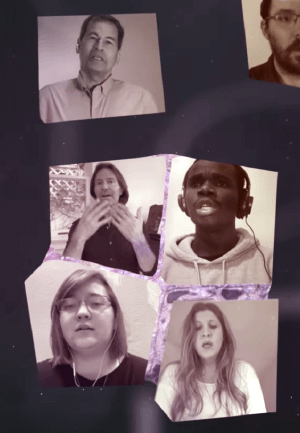Pandemic Pastime: Virtual Choirs
With thousands of chorally connected peers, a socially distant singer rediscovers her voice

On March 13, my hyper-busy life came to a screeching halt. You remember the feeling.
Coronavirus cases were on the rise in my area, outside Kansas City. My job went into work-from-home mode. I was no longer able to see family living in a senior care facility where I had been a daily visitor. No running a million errands, no restaurant dinners with my spouse, no face-to-face chats with friends; suddenly, it all … just … stopped.
My rigid routines, my endless to-do lists, the patterns that dictated my daily life were completely disrupted. I had pandemic panic attacks. Exhausted, I slept and slept and slept. I had to evolve new ways to work on projects and tight deadlines. Slowly, slowly, my days began to seem not normal again but survivable. And in the newfound space and quiet, I discovered — or rediscovered — my voice.

I’ve always been a singer — classically trained, I’ve sung in school and church choirs, as a soloist for hire at events, in pop performance groups, in musical theater, in my car…. But after college, music mostly stayed on the backburner, pushed aside for career and family concerns. But in this virus-enforced moment of quiet where time seemed suspended, opportunities to sing once again began to find me.
A couple of well-known giants from the world of a cappella music decided to create a fundraiser for America’s first responders and invited anyone — anyone! — to join them in a new recording of one of their best-known hits. Me? Sing with Sean Altman and Barry Carl? The chance was too rare and appealing to pass up; so, terrified and exhilarated, I volunteered. Using the guiding vocal video they supplied, I recorded myself singing in harmony … over and over and over again. I ran out of breath. I sang the wrong word. My hair looked completely crazy. Finally, I admitted to myself it would never be perfect in my eyes and just sent my best take to an editor who would splice together my video with 37 others to create the final product.
While waiting for this project to be released, news of a new vocal challenge reached my eager ears. A classical composer planned to assemble a virtual choir at some point in the future — “join the mailing list for updates.” I joined April 29.
Researching this composer, I came across his TED Talk. Eric Whitacre had been creating virtual choirs since 2010 and was planning his sixth in the spring of 2020. His fifth virtual choir had been more than 8,000 voices strong. Each singer recorded their part at home while watching a prerecorded video of the conductor leading and listening to a piano accompaniment. Each choir was made up of singers of varying experience from all over the world. Every age, every ethnicity, every skill level was represented.
Surprise! Three days later, Virtual Choir 6 was officially in production, far earlier than originally anticipated. Whitacre had quickly written a new composition, “Sing Gently,” to bring unity and healing to a Covid-stressed world. I learned the new song, videotaped myself performing it — yes, over and over and over … — and submitted my best take on May 15.
The finished video for my first project, “A Change in My Life,” premiered June 14. I shared it virtually with friends and family, overjoyed to be joined in a worthwhile cause with my a cappella heroes.
Then on July 19, Eric Whitacre’s Virtual Choir 6 debuted “Sing Gently.” It united a record-breaking 17,572 singers into the world’s largest-ever virtual choir with members ages 5 to 88 from 129 countries. The video quickly reached more than 1 million YouTube views and topped classical charts on Spotify and Apple Music. “CBS Sunday Morning,” NPR, and CPR aired feature stories about this remarkable event.
While it’s amazing to be part of something so widely lauded, most rewarding was reclaiming my voice and becoming part of an inclusive worldwide community musically joined to share hope and healing. By nature perfectionistic and introverted, I was invited to bring my flaws and my passion to a judgment-free collaboration with people I will most likely never meet face to face to create intangible beauty. That community lives on beyond this project through a Facebook Group that continues to enthusiastically encourage and support singers, whoever and wherever we are. Despite the dizzying diversity of the lives we lead across the globe, we will always remember this breathtaking moment in the midst of worldwide death and despair that we “sang gently” as one to comfort … to heal … to inspire.
Choral music, welcome back to my life. It’s been too long.
* * *
Directing Mensans in Virtual Choirs
Contributed by Bill Paisner
I am the founder and director of the Southwest Women’s Chorus, based in Temecula, Calif., and now in its 20th year. Like choruses all over the world, ours has faced cancellations — so far, three seasons — because singing is one of the riskiest activities for infection.
As part of keeping the chorus alive during this time, we have created six virtual performances so far. For those unfamiliar with this, the singers practice their individual parts at home and then submit a video of themselves singing that part. I combine and synchronize the videos into one visual performance by placing their faces at different spots in the final video.
With our success in this area, I wanted to expand the idea to the Mensa community. In conversations with Simone van Egeren of San Diego Mensa, we first presented the idea to the San Diego community and then expanded it to the Region 9 community. I am happy to say that we had enough singers to do our first virtual performance project: “Don’t Sit Under the Apple Tree,” made famous by the Andrews Sisters. It was a women’s chorus because we did not have enough men singers to allow a mixed chorus. If enough show up in the future, we will certainly include them.
This Mensa project offers singers whose choruses have stopped rehearsing and performing a chance to keep their skills alive. It can’t make up for the loss of blending or the general camaraderie, but at least we have the opportunity to make music again. And, given the feedback they receive when playing back their videos before submitting them, they can become better musicians.
For more information, contact me at wpaisner@post.harvard.edu. You can also learn more about me and the Southwest Women’s Chorus at southwestwomenschorus.org.
